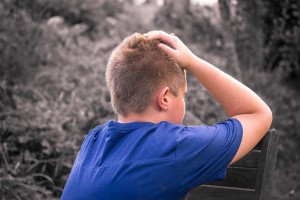Spider Man is visiting children at the George R. Brown Convention Center in Houston. You heard that right. A person dressed in a Spider Man costume has been visiting kids in the shelter, handing out stickers and generally trying to put a smile on the faces of some of the city’s younger evacuees. This small but noteworthy act of kindness brings to light how Hurricane Harvey has impacted—and will continue to impact—some of its youngest victims.
A catastrophe such as a hurricane, earthquake, tornado, fire or flood is frightening for both children and adults. While that’s certainly the case for the people who experience the disaster firsthand, it’s important to keep in mind that children who watch these events unfold on TV may be affected as well. That’s why it’s important to talk with your child and acknowledge the frightening aspects of the disaster. Falsely minimizing the danger will not end your child’s concerns.
Several factors affect your child’s response to a disaster. Here are a few to keep in mind:
- The degree of destruction: Your child’s reaction depends on how much destruction he or she sees during and after the disaster. If a friend or family member was killed or seriously injured—or your home was severely damaged—there is a greater chance that your child will experience difficulties.
- The parent’s response: The way your child sees and understands your response to the disaster is very important. Children are aware of their parents’ worries most of the time, but they are especially sensitive during a crisis. It’s okay to admit your concerns to your child and to stress the ability to cope with the situation.
- The age of your child: Your child’s age affects how he or she will respond to the crisis. That’s why it’s so important to explain things at your child’s level, using words he or she can easily understand.
Post-Traumatic Stress Disorder (PTSD)
It’s not uncommon for people of any age to develop post-traumatic stress disorder after a disaster or crisis. PTSD is defined as psychological damage resulting from experiencing, witnessing or participating in an overwhelmingly traumatic event. If you live in the Houston area or you have family or friends who have been affected by Hurricane Harvey, watch for PTSD symptoms in your loved ones.
Children with this disorder have repeated episodes in which they re-experience the traumatic event. They often relive the trauma through repetitive play. In young children, distressing dreams about the traumatic event may develop into nightmares. Keep in mind that PTSD rarely appears during the trauma itself, although symptoms can occur soon after the event. It’s more likely that the disorder will surface months or even years later. If your child has been affected, watch for these changes in behavior:
- Refusal to return to school and clinging to mom or dad
- Persistent fears related to the catastrophe, such as the fear of being permanently separated from parents
- Sleep disturbances that persist for several days after the event, such as nightmares, screaming during sleep and bedwetting
- Loss of concentration and irritability
- Behavior problems at home or school
- Physical complaints, such as headaches and stomachaches, that have no physical cause
- Withdrawal from family and friends, decreased activity and preoccupation with the disaster
Fortunately, professional advice and treatment can help prevent or minimize PTSD in children and adults who are affected by a natural disaster such as Hurricane Harvey.
David Lowenstein, Ph.D. is a psychologist and the clinical director of Lowenstein & Associates, Inc. in Columbus, Ohio. In addition to providing therapeutic services to individuals and families, he offers training and consultation to numerous associations, schools and agencies around the country. Additionally, he is a frequent radio and TV guest and a resource and contributing writer for numerous newspapers and magazines nationwide. Contact Dr. David Lowenstein at 691 South Fifth Street, Columbus, Ohio, 43206 or call 614.443.6155 or 614.444.0432.


